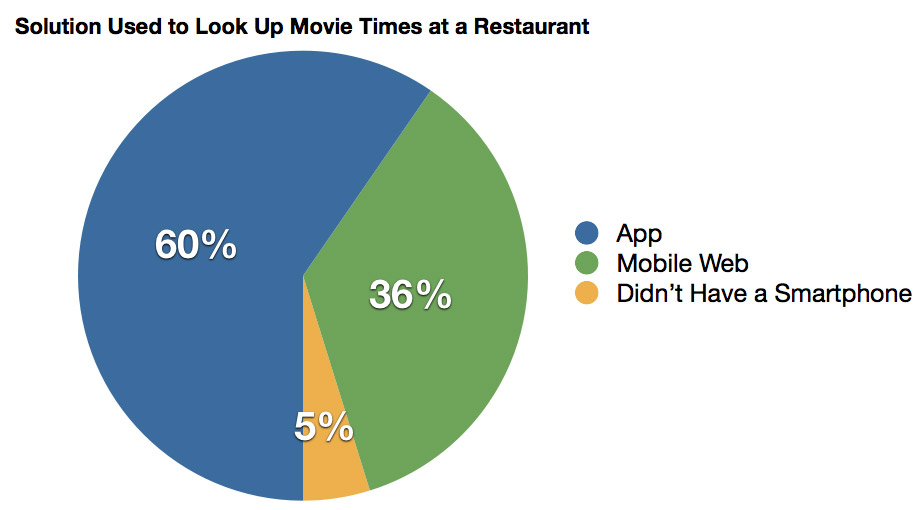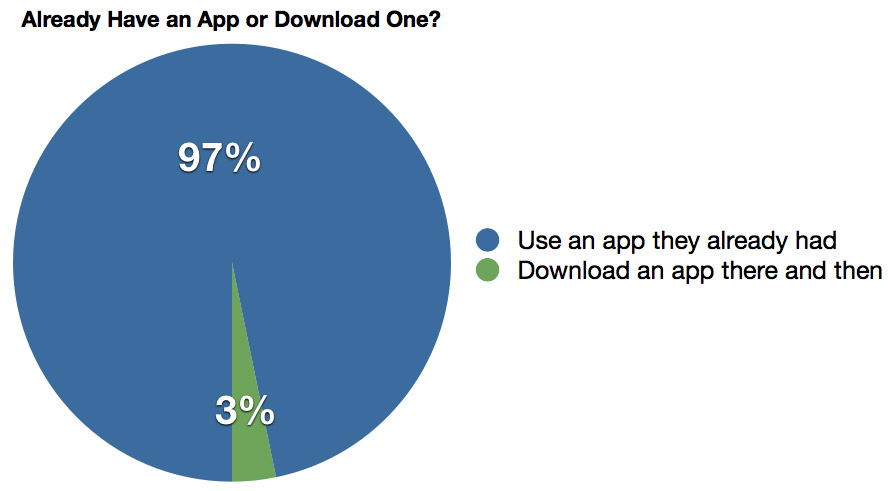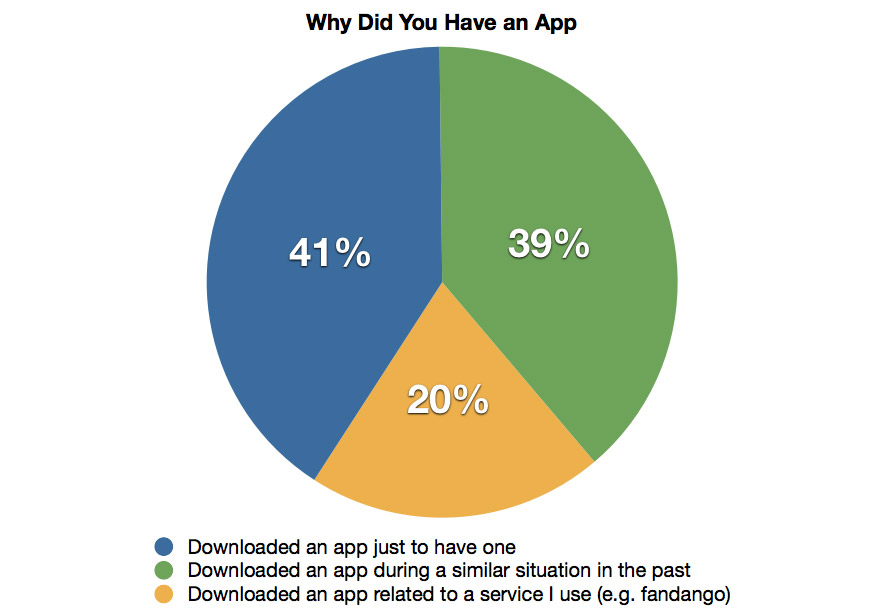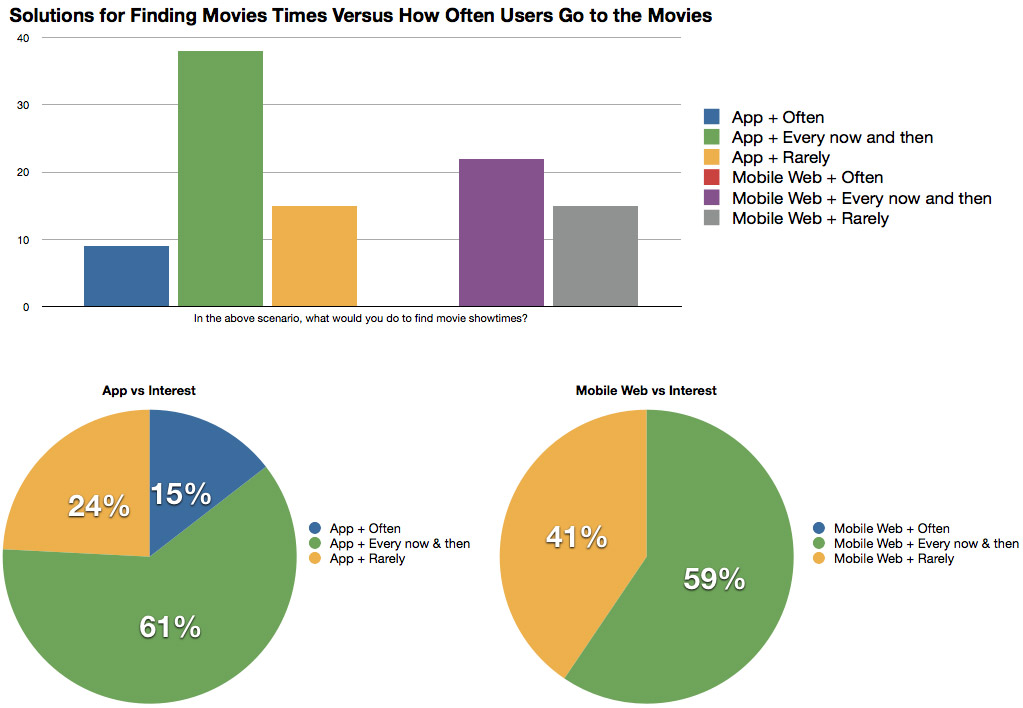Last week I posted a survey where I asked, "How would you use your phone to find movie times?" Over a hundred folks responded to my quick, four question survey. Surprisingly, only two people actually asked me what I was looking for.
The Hypothesis
In my recent talk, Developing a Progressive Mobile Strategy, I discussed why a mobile strategy, especially for higher education, has to be about more than just an app. One of the things I focused on was audience and, specifically, the importance of the urgent user (i.e. someone trying to find information to answer an immediate need).
For the urgent user there are essentially three ways to access content from their mobile device (leaving aside calling someone or using text messaging):
- Having an app already installed to address their needs.
- Going to an app store and downloading an app to address their needs.
- Going to a website to address their needs.
It's the second option that I was really curious about. I wanted to know if it was a truly viable option for the urgent user. If not, then option three becomes that much more important. To me option two is not viable for several reasons but, being a mobile web-focused guy, it wouldn't have surprised me to be wrong based on my biases.
Related to this notion of an urgent user with urgent needs, there was a sentence from Josh Keller's (@josh_keller) recent piece, As Mobile Devices Multiply, Some Colleges Turn Away From Building Campus Apps, where I think the person quoted gave too much weight to the importance of platform.
Colleges without [an app] will miss reaching a critical group of tech-savvy users who "10 times out of 10″ prefer downloading an application over using a mobile Web site, which serves the "everyone–else bracket," [Kayvon Beykpour (@kayvz), vice president of Blackboard Mobile] says.
My problem with this quote is not that I think people don't like apps or that, somehow, mobile web can or will be all that a school needs. I've been very clear that I don't think we're in a mobile web versus native situation anymore. My problem is that it sort of dismisses how users actually use their devices to find information. That platform trumps actual usefulness. Not every piece of content you have that a user may need will fit in an app and not everyone will have the app when they have a need. Mobile-optimized web content doesn't serve "everyone else," it serves everyone.
The purpose of the survey, therefore, was to see where users, in an urgent need setting, turned to find information and how their interest in a topic might affect the solution they chose.
The Scenario
For the survey I created a pretty simple "urgent need" scenario that I expect most everyone can relate to. It definitely has both app and mobile-optimized solutions to it that the regular person should be aware of. This is similar to the piles of content that universities already have online that users are probably aware of.
You're out with friends having a lovely dinner when someone suggests going to see a movie. How would you go about finding what movies showing and what time movies are playing at nearby movie theaters?
You can see the original four questions that made up the survey on Google Docs.
The Results
Roughly 100 people submitted responses. I only advertised the survey on Twitter and my blog so I guess the caveat is that the results could be skewed towards slightly more technical users. That being said the numbers worked out roughly the way I expected.
Most Used: App or Mobile Web?
The chart…

60% answered that they would use an app to answer their need but a sizable chunk, 36%, would use the mobile web to answer this particular need. When one out of every three folks feel comfortable going to the mobile web to answer a need then it shows it needs to be a part of a mobile strategy alongside app solutions.
How Many Would Download an App?
The chart…

This is the one actually surprised me. Only two people answered that they would download an app there and then in the restaurant. It's not that I expected a huge number of people to do this but I would have guessed more than 2% of all users would go that route. I think it hints at how and when users "discover" apps though…
When Did a User Download the App?
The chart…

This graph leaves me a bit confused. If, when not having an app, only 2% of respondents say they would download one then how could 39% of people download an app in a similar situation. The 39% seems a bit high. Maybe this is a common problem so those folks who use apps would have gotten it out of the way early? Maybe the question was poorly worded because I included the qualifier "similar?"
Does Interest in the Topic Affect App versus Mobile Web Solution Selection?
I was also curious if interest in the topic would affect the solution chosen. It seems that this should be a no brainer and it appears that it sort of is.

The more likely a user was to attend the movies the more likely they'd have an app. Of the nine folks who had a smartphone and said they went to the movies often, all nine had an app. No one who chose mobile web self-identified as going to the movies often. Also, mobile web users were more evenly split between attending movies "every now and then" and "rarely" with the same number of mobile web and app users saying they rarely go to the movies.
The Conclusion
I think this survey only scratched the surface in regards to the decision-making process of how users with an urgent need would find information. I kept it short in the hopes of getting more submissions. For example, I didn't ask any questions in regards to why a user would choose mobile web (e.g. "the app you wanted isn't available for your OS?") *or why a user might not choose to download an app (e.g. "did length of download times or needing to search an app store stop you?"*). I don't think that invalidates the results but, obviously, more study could be done.
What I think the results do show, though, is that their are indeed two viable avenues that users will take to find your information. The more interested they are in a topic or bit of content the more likely they'll try to find an app before their need ever arises but, when the need arises, if they don't have an app they're probably defaulting to the web.